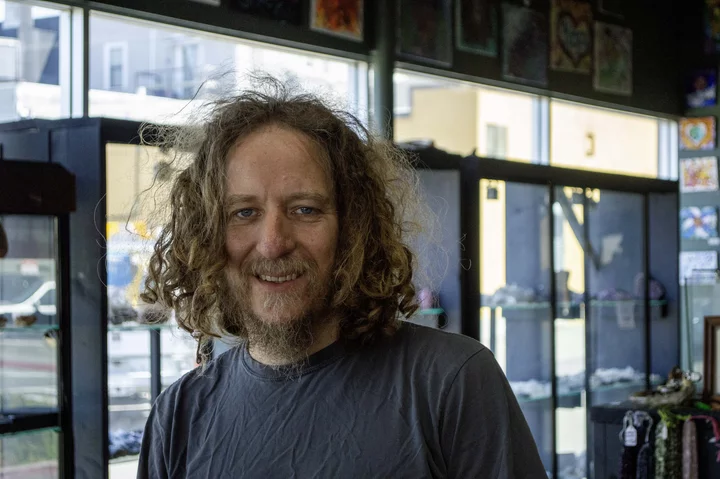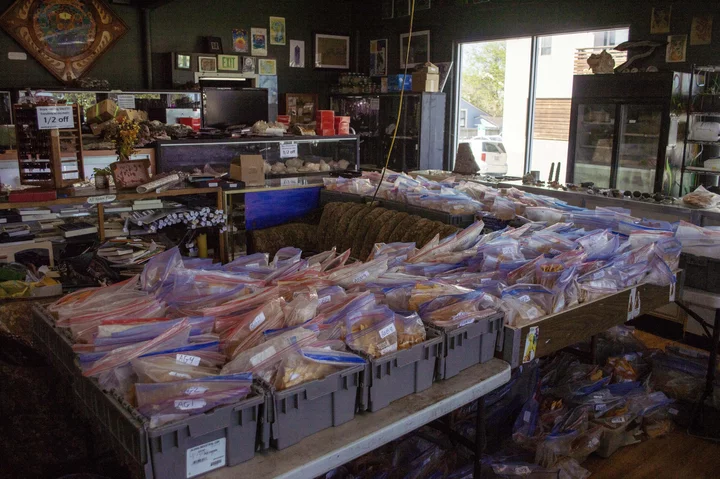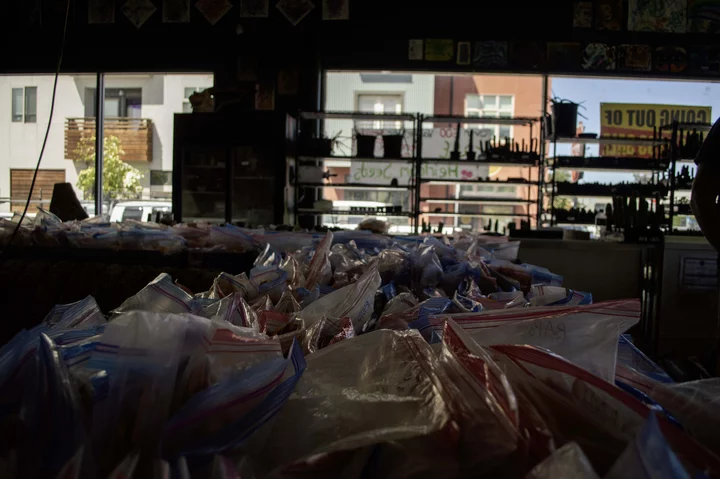Michael Reeves. Photos by Dezmond Remington.
The promise is strange, but it is true; the promise is good — too good! — but it is real; the promise is there for the taking, there for the brave and the curious and the handy. For no cost at all, anyone that emails the right address and doesn’t ask for more than they deserve can get the gift of life.
It’s an incredible thing to say, that any curious soul can, with a well-placed request, get the gift of life for free, but it’s not a huge exaggeration. What is probably the largest free seed distributor in the world is based out of Arcata. They offer 687 varieties of just about every vegetable, fruit, flower, and herb growable in North America. Some are common, some are harder to come across than gold in a river, and some — what the hell is a fenugreek?
The man behind FreeHeirloomSeeds.org, Michael Reeves, 48, is also the owner of the Arcata mineral store Stone Spirits (although he’s closing it to focus on the seeds). In 2011, he posted a sign on the outside of the storefront saying he’d give a free strawberry plant to anyone who came in and asked for one. He had 1,000 of them, purchased from a wholesale grower, and the masses swarmed in to take the plants and buy gems. Over the next six years, Reeves gave away an estimated 15,000 strawberry plants.
It was an excellent way to get people in the store, but there’s more to it than that for Reeves.
“After years and years of formulating all of these plans to help our society and help guide humanity to be more in harmony with our ecosystem,” Reeves said, “I just felt like I had to do something in some kind of material way that was measurable.”
The table of seeds to be sorted, packaged, and sent off.
Reeves wanted to expand the strawberry giveaways to more stores, but keeping the plants alive for longer than a couple weeks was difficult, and he also thought that putting the burden of taking care of thousands of strawberry plants in a store would be too hard. It wasn’t too big of a deal for him (he’s been gardening since he was a kid), but it’s simple for people without a green thumb to kill them.
He landed on plant seeds as a solid alternative. In 2017, he spent $300 on 30 different types of plant seeds and found more out in the wild, all of them heirloom varieties, old strains of plants that aren’t usually grown as commercial crops. Reeves started giving them away at his store, and people started sending letters, and then he created a website. It snowballed.
“As far as I know, we’re probably the world’s largest, most comprehensive free seed service,” Reeves said. “We’re definitely the most comprehensive. There might be somebody out there that’s giving away more in terms of volume than us…There’s a few groups that give away specific seeds for, like, the monarch butterfly or this or that, but there’s not really anybody doing what we’re doing.”
Reeves said he has given away more than 300,000 packs of seeds, all of them donated to him, grown by himself, found out in the wild, or purchased with donations. Reeves suggests that people who want seeds send $10 for every 15 packets of seeds they request. That’s roughly the amount he needs to break even. If someone requests a lot of seeds and doesn’t donate, they probably won’t get any seeds. Right now, about half of the people asking for seeds donates. Earlier in the season, when the serious gardeners are ordering dozens of packets of seeds to prepare for the upcoming growing season, the proportion is much higher.
The donations also pay for a few full-time employees who help package and send out the seeds. They send out about 200 packages a day. Fortunately, the post office is just down the street.
The Facebook group Reeves created in 2020 to share heirloom seeds is a few hundred people shy of 155,000 members. They post paeans to Earth’s glorious bounties and requests from other seed-sharers for varieties like “pink lemon blueberry” and “snowball improved cauliflower” and “iso pawpaws,” thousands of people trying and failing and succeeding at turning bare patches of soil and leftover scraps into something delicious and nourishing.
It is not a cheap venture for Reeves, nor is it a lark. He moved to Arcata from the Midwest in 2008 to sell his gems, and he’s closing the store so he can focus on the seeds. He and his wife and two kids spent a couple years living in a retrofitted school bus before being forced to move off of the land they were parking on. They spent COVID in the bus out on the streets. Vandals broke into the store and destroyed windows and stole gems. Now he’s closing the store and mortgaging his house to fund the purchase of a farm in Ferndale so he can grow more of the seeds he’s going to give away, which is also time-consuming and laborious.
A few months ago, some TikToker mentioned FreeHeirloomSeeds in a video and they were totally inundated with requests. None of the other people packaging the seeds showed up, but Reeves decided to stick it out and worked a series of 20-hour days to deliver thousands of orders. He’s shut the operation down before, but decided not to that time.
“When I was very young, I thought, ‘Oh, look at my nieces and nephews there. What kind of world are they gonna have?’” Reeves asked. “And now, I look at my kids, I think the same thing. And it’s not only just the struggle to survive, but I believe the world could be so much more beautiful and so much more fun, so much more loving, and we could all be a lot happier if we just did some things that benefited one another instead of just constantly living for ourselves.”
The store today is about equally divided between space for seeds and space for gems and space for two wild-haired kids to run around, grow their own plants and try making teas out of cilantro and snacks out of raw mustard shoots, but Reeves has dreams beyond even this and the farm. FreeHeirloomSeeds is also a mission of conservation. Rare breeds of fruits and vegetables frequently go extinct, and sharing their seeds is an easy way to ensure that happens less and less. Reeves wants to start a local seed bank to preserve more of those, and make it even easier for people to grow their own plants. Reeves believes that a focus shift from buying produce produced by a globalized economy to a more local one would be better for everyone.
“You go into the grocery store and you look and see carrots from Colorado,” Reeves said. “This stuff is from all over the place. Go buy a jar of artichokes; they’re probably from Argentina or something, but they grow great around here.”
Despite the huge diversity of seeds on the website, there are a few heavy-hitters that people tend to order over and over again, like butter crunch lettuce or Cherokee purple tomatoes.
He hopes that in Ferndale they’ll be able to produce seeds that are normally fairly expensive only because no one is growing them, like a multi-colored Echinacea that can retail for a dollar a seed but are super easy to grow. Many of these varieties offer less commercial value or aren’t suited to a modern palette, but are valuable parts of history in their own right.
“These are seeds that can be produced like no problem,” Reeves said. “If you just grow the crop, it only takes a minute.”
“I can say that [getting thousands of orders] is surprising or whatever, but it’s actually not that surprising, because we recognized the need from the beginning. … Anyone can help save a species. Anybody can do something good for their community. We’ve been struggling against homelessness the whole time while we did this — it’s not necessarily been easy — but it’s very gratifying. Basically, what I’m trying to say is: If you try to make a difference, you’d be surprised at the results.”



CLICK TO MANAGE